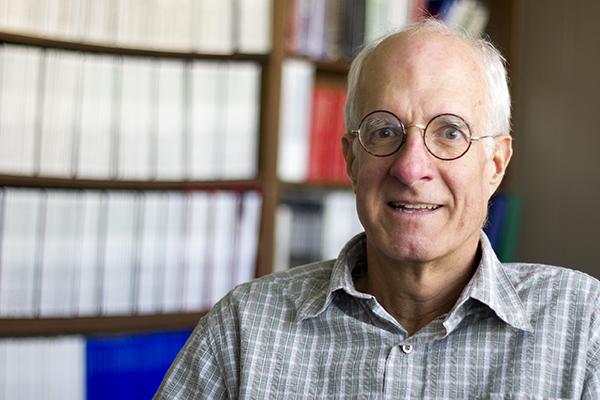Phil Watts pioneered the exercise science graduate program at NMU and the sports science undergraduate degree as well. He brought part of an Everest summit team to campus in 1983 for high-altitude research. He pushed for the installation of the first rock-climbing wall in the PEIF, and the subsequent upgrades and renovations that have led to the PEIF’s current climbing setup.
So, as the question has been posed a handful of times now: Just who is this Watts character?
Watts graduated first from East Carolina University with his B.S. and M.A., then earned his Ph.D. from the University of Maryland. But his beginning wasn’t in exercise science or physiology; it was in music.
Watts played the trumpet at a very high level and planned to study music in college, but when he found himself competing with kids who were in the London Symphony, he decided to pursue other passions to preserve his own sanity.
“People think I grew up in rock climbing,” Watts said, “but honestly I grew up as a trumpet player. That’s what’s great about these lifelong passions; I don’t have to be a professional musician to play music all
my life.”
He drew a comparison to outdoor athletes, such as runners, climbers, cyclists and so on; we can do work that satisfies us, Watts says, and we can play. The two don’t have to be one and the same—they just have to coexist.
But as many tend to wonder about Marquette transplants, how did this professor-to-be leave the balmy east coast to inhabit these brisk northern climes?
“My wife and I drove up here from Maryland in the winter of 1978, in the calm between two snow storms,” Phil Watts said of his beginnings on NMU’s faculty.
Watts is currently the longest-term professor on campus, but not for much longer; after teaching for nearly four decades, the winter of 2016 will be his final semester.
“I’ve been here for over 37 years now,” Watts said. “We (he and his wife) came here with a two-year plan, just to build our resumés and head back to the east coast. But within a month of arriving we met a group of people who showed us how to play. They introduced us to skiing, snowshoeing, winter camping—we fell in love with Marquette. It was maybe a couple of months into our ‘two-year plan’ when we decided we wanted to stay.”
He and his wife worked with groups of kids through 4H in a program called “Toon Busters,” advocating kids getting outside on Saturday mornings rather than sitting inside watching TV. Watts ran the program for more than 20 years before handing
it off.
Watts walks every day from his home, which is a short distance from Econo Foods, across town to his office at the PEIF.
“I actually drive past him a lot of mornings, on the way to work myself,” Maggy Moore, an associate professor in the athletic training department, said of Watts. She also related the story of a time when Watts was laid up with a back injury; an exchange student of his, from India, took a bus across town on a brutally cold winter day to deliver some homemade soup to the professor. “That’s how Phil has always been,” Moore said. “He has always gone above and beyond, and earned a lot of respect from his students.”
Scott Drum, professor of sports science, first learned of Watts long before Drum ever considered coming to NMU. In 2010 Drum was teaching in Colorado and writing a book chapter about rock climbers as athletes, and Phil Watts’ name just kept coming up.
“Watts was the preeminent researcher in rock climbing during the 1980s,” Drum says of his elder, whom he has conducted research with.
Watts has presented his work and research findings at national and international conferences through the years, taking his climbing and mountaineering gear wherever he goes.
“I’ve gotten to climb in Spain, in England and all over the U.S., just traveling to conferences,” Watts said with a grin.
“It’s great.”
His garage, it’s been said, is wallpapered with scientific diagrams and conference posters. Wherever there aren’t hand and foot holds, that is; Watts has an indoor bouldering wall installed, right next to where he parks
the car.
So for a guy who’s been a fixture on NMU’s campus and in the field of exercise science for decades… what’s next?
“People ask me what I’m doing after I’m done teaching, where I’m going to retire to—” he threw up his hands at this question. “Move? I’m not going to move. Marquette is great, just about everything I love is here. I’m not going anywhere.”




























